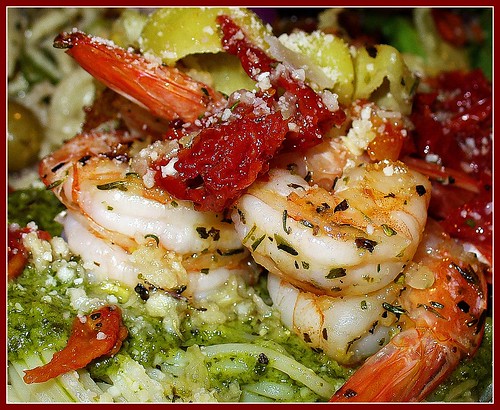Photo note:
"
Please View Large On Black
My sister made this delicious shrimp dinner for us, sauteed shrimp in garlic and olive oil, on pasta with pesto sauce and sun-dried tomatoes with olives and peppers...wow was this ever delicious! I love seafood, especially shrimp.
INFORMATION ON SHRIMP
Shrimp are swimming, decapod crustaceans classified in the infraorder Caridea, found widely around the world in both fresh and salt water. Adult shrimp are filter feeding benthic animals living close to the bottom. They can live in schools and can swim rapidly backwards. Shrimp are an important food source for larger animals from fish to whales. They have a high resistance to toxins in polluted areas, and may contribute to high toxin levels in their predators. Together with prawns, shrimp are widely caught and farmed for human consumption.
Etymology: The term shrimp originated around the 14th century with the Middle English shrimpe, akin to the Middle Low German schrempen, and meaning to contract or wrinkle; and the Old Norse skorpna, meaning to shrivel up.
While in biological terms shrimps and prawns belong to a different suborders of Decapoda, they are very similar in appearance. In commercial farming and fisheries the terms shrimp and prawn are often used interchangeably. However, recent aquaculture literature increasingly uses the term "prawn" only for the freshwater forms of palaemonids and "shrimp" for the marine penaeids.
In European countries, particularly the United Kingdom, the word “prawn” is more common on menus than “shrimp”; while the opposite is the case in North America. The term “prawn” is also loosely used to describe any large shrimp, especially those that come 15 (or fewer) to the pound (such as “king prawns”, yet sometimes known as “jumbo shrimp”). Australia and other Commonwealth nations follow this British/European use to an even greater extent, using the word “prawn” almost exclusively. When Australian comedian Paul Hogan used the phrase, “I'll slip an extra shrimp on the barbie for you” in an American television advertisement, it was intended to make what he was saying easier for his American audience to understand, and was thus a deliberate distortion of what an Australian would typically say.
As with other seafood, shrimp is high in calcium, iodine and protein but low in food energy. A shrimp-based meal is also a significant source of cholesterol, from 122 mg to 251 mg per 100 g of shrimp, depending on the method of preparation. Shrimp consumption, however, is considered healthy for the circulatory system because the lack of significant levels of saturated fat in shrimp mean that the high cholesterol content in shrimp actually improves the ratio of LDL to HDL cholesterol and lowers triglycerides. Shrimp and other shellfish are among the most common food allergens. They are not kosher and thus are forbidden in Jewish cuisine.
Source: Wikipedia"

No comments:
Post a Comment